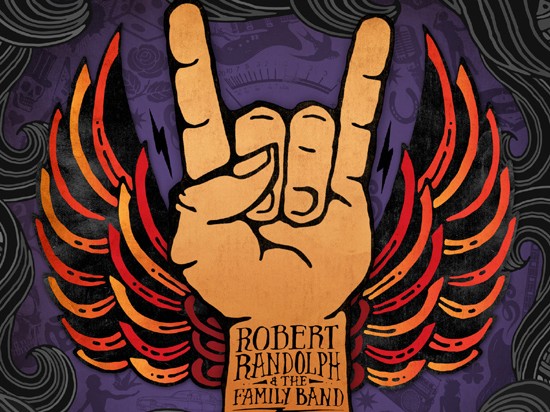Robert Randolph and The Family Band - Lickety Split

Fostered in the "sacred steel" community of the Pentacostal House of God Church, Robert Randolph began making sacred music as a teenager, learning to play the pedal steel guitar by observing how the gritty instrument was used in church services. "Growing up as a kid in the church, you always wanted to be the pedal-steel guy," he told NPR. "Because you were, you know, the main rock star." Later, when he began incorporating aspects of secular music, namely funk and soul, into his gospel act, his mastery of the relatively obscure instrument proved a lucrative gimmick, serving to augment his already notable talent by taking the pedal steel out of its conventional country music ouvre. In the early 2000s, Randolph fashioned a Family Band by commandeering cousins Marcus Randolph and Danyel Morgan (drums and bass, respectively) and sister Lenesha Randolph (vocals), along with guitarist/keyboardist Brett Haas, and with them he rode the gospel-blues wave straight onto Rolling Stone's list of the 100 Greatest Guitarists:
Randolph's family band is one of the most intense live acts in all of jamdom. His thirteen-string instrument has a chillingly clear tone, and his solos are dotted with howling melodies and perpetually cresting, lightning-fast explorations.
As a jam band hero and enthusiastic showman, Randolph is already known for the echoing gulf between great live shows and disappointingly sub-par albums. Maybe it's that the unspoken philosophical demands of albums, the pressure to produce a cohesive and timeless artistic statement that transcends the uninhibited revelry of a live show, remain unmet. Maybe it's the fact that gnarled shredding and non-stop canned interjections ("Turn it up!," "That's it!," "Cmon!," "Get ready!") lose their magic transitioning from stage to studio. Maybe it's that on second listen, you realize that the stories of "Blacky Joe" and "Welcome Home" don't develop at all (who is Blacky Joe and what did he even do? Yeah I didn't catch that either) and/or amount to characterless empty clichés. That on the whole, Lickety Split feels embarrassingly insincere and fails to prove that the gospel artist's chosen anachronistic idioms are alive and well.
Take for instance the track "Born Again," which sets up a neat euphonic groove and carries energetic praise-the-lord lyrics, yet outside of being a solid, funky gospel song, it's entirely forgettable. Mix some family-friendly hip hop breaks into a blandly dreamy Calypso shuffle and you've got "New Orleans," which has the aesthetic appeal of commercial art, like those mass-produced paintings of the beach or a pretty sunflower you might find at your local dentist, and in that same sad, non-ironic way. The most noteworthy aspects of Lickety Split are Rudolph's egotistic jam sessions with Carlos Santana, but without being part of a meaningful musical package, who cares about virtuosity?
Yes, the record is definitely "amped up." At least seemingly so. But one could never say for sure when the emotion is expressed through boringly familiar rhyme schemes saturated with obnoxiously hackneyed phrases like "big trucks, big wheels" and "hot like apple pie" in "All-American," or the dreadful title track with its 30-plus shameless clichés (I counted) including ye olde counting motif "1-2-3-4-5-6-7-8" and "party like it's 1999." Not to mention jumping on the fuck-wall-street bandwagon while dissing the wife: "[she] sneaks my money while I'm asleep, never gonna get it back, rather have her steal it than the man from Goldman Sachs."
Fortunately, some lyrical respite comes when Randolph puts the pen down and opts instead for a classic rock cover or two, such as the 1966 Rascals hit and rock-and-roll standard "Good Lovin'," though I can certainly see why it fits the content-free spirit of Lickety Split. It's a strategy used to great effect at his live appearances, where crowds will throw fits of tipsy delight for anything they recognize, but Randolph's reiteration doesn't have the same facile charm on record.
Looking at him as a benefit-hopper who founded the Robert Randolph Music and Arts Program and recently embarked on a project to remodel an abandoned school building in his New Jersey hometown, one could dote endlessly on Rudolph's character and contributions to the world of music. Perhaps he was over-stressed while minting this fifth studio record in the RR&TFB collection. But its strict adherence to worn-out idioms and uninspired musical formulas are a recipe for another shelf-bound novelty album to break out the next time your coworker brings his kids over for a playdate.